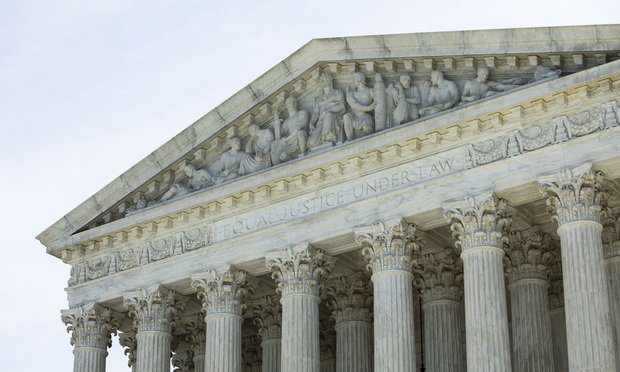At US Supreme Court, UPenn ERISA Class Rebuts 'Apocalyptic Warnings'
"The decision below could not possibly threaten the availability of retirement plans, as petitioners and their amici suggest," attorney Jerome Schlichter told the Supreme Court.
February 26, 2020 at 06:04 PM
5 minute read
 U.S. Supreme Court. Credit: Diego M. Radzinschi/ ALM
U.S. Supreme Court. Credit: Diego M. Radzinschi/ ALM
Lawyers for University of Pennsylvania employees and retirees suing the school for alleged retirement-benefits violations asked the U.S. Supreme Court on Wednesday to turn down a petition that said the allegations had failed to meet certain threshold standards to proceed in court.
Participants in Penn's $3.8 billion retirement plan won a key ruling in the U.S. Court of Appeals for the Third Circuit last year that revived core elements of the complaint alleging a breach of fiduciary duty under the federal Employee Retirement Income Security Act, or ERISA. The plan participants, represented by Jerome Schlichter of the St. Louis firm Schlichter Bogard & Denton, contend Penn "caused the plan to pay wholly unnecessary fees, resulting in millions of dollars in lost retirement savings."
Penn's lawyers at Morgan, Lewis & Bockius asked the Supreme Court in December to review the Third Circuit's decision. Last month, the justices directed Schlichter to respond to Penn's petition.
"The decision below could not possibly threaten the availability of retirement plans, as petitioners and their amici suggest," Schlichter told the Supreme Court on Wednesday. "In fact, similar litigation has caused significant fee reductions and improved administration of defined contribution plans across the country, thus enhancing the retirement security of the tens of millions of American workers who participate in such plans."
The Supreme Court has shown an appetite in recent years to take up ERISA cases. The court has four retirement-benefits cases on this term's docket, and one of those cases, in an opinion issued Wednesday, was seen as a big win for employees. That ruling, in the case Intel Corp. Investment Policy Committee v. Sulyma, confronted when and how an employee had "actual knowledge" of an alleged fiduciary breach.
The complaint against Penn was part of a wave of suits in recent years targeting universities and colleges. The Johns Hopkins University, Brown University, Duke University and the Massachusetts Institute of Technology are among schools that have settled ERISA claims. Penn's petition said settlements have averaged about $11 million per school.
"Yet even though no plaintiff has prevailed on the merits of these allegations, universities face immense pressure to quickly settle any claims that survive the pleading stage," Morgan Lewis partner David Salmons in Washington, chair of the firm's appellate practice, said in Penn's petition. "It is extremely expensive to litigate ERISA class actions, and the amount of money theoretically at stake is staggering."
The Penn case at the Supreme Court raises questions about the pleading standard necessary to bring a claim alleging breach of fiduciary duty under ERISA. Schlichter and Penn's lawyers at Morgan Lewis dispute the scope of the Third Circuit's ruling. Schlichter told the justices that the appeals court applied the right standard, and that the amended complaint presents a sufficient factual basis supporting claims that the university and its retirement plan administrators breached their ERISA fiduciary duties.
Judge Jane Richards Roth of the Third Circuit, writing in a dissent, said the Penn case, and others like it, should "be carefully scrutinized in order not to permit implausible allegations to result in a large settlement, under which a substantial portion of the funds that are to be reimbursed to retirement plans are instead diverted to attorneys' fees."
Several groups or organizations filed friend-of-the-court briefs backing Penn at the Supreme Court. Lawyers from Goodwin Procter, including Jaime Santos as counsel of record, submitted a brief from the U.S. Chamber of Commerce. Wilmer Cutler Pickering Hale and Dorr partner Paul R.Q. Wolfson, co-chair of the firm's appellate and Supreme Court team, filed an amicus brief on behalf of the Teachers Insurance and Annuity Association of America (TIAA).
 Wilmer offices in Washington, D.C. Credit: Diego M. Radzinschi/ ALM
Wilmer offices in Washington, D.C. Credit: Diego M. Radzinschi/ ALM"Penn will be subject to burdensome discovery and enormous settlement pressure, and if the Third Circuit's decision is not reversed, the harm will likely spread to other universities as well," Wolfson told the justices.
Penn's lawyers said the university has "worked to steadily reduce the costs of the plan's investment options over the proposed class period."
"If respondents' garden-variety allegations can subject petitioners to costly class-action litigation despite all their efforts, it is hard to imagine a retirement plan fiduciary that can rest easy," Salmons of Morgan Lewis told the court.
Schlichter told the justices the Third Circuit's decision poses no broad harm to the investment-retirement industry.
"These apocalyptic warnings also are entirely baseless," he wrote in Wednesday's filing. "Enforcing ERISA's long-standing statutory duties cannot possibly pose any significant risk to the availability of retirement plans."
Sign up here for ALM's Labor of Law newsletter for news and trends in the labor and employment space.
This content has been archived. It is available through our partners, LexisNexis® and Bloomberg Law.
To view this content, please continue to their sites.
Not a Lexis Subscriber?
Subscribe Now
Not a Bloomberg Law Subscriber?
Subscribe Now
NOT FOR REPRINT
© 2025 ALM Global, LLC, All Rights Reserved. Request academic re-use from www.copyright.com. All other uses, submit a request to [email protected]. For more information visit Asset & Logo Licensing.
You Might Like
View All
Former Perkins Coie Partner Moves to Stradley Ronon in Chicago

Proskauer Rose Investment Management Trio Jumps to Stradley Ronon


Stradley Ronon Bolsters Investment Management Practice With Vanguard Hire
4 minute readLaw Firms Mentioned
Trending Stories
Who Got The Work
J. Brugh Lower of Gibbons has entered an appearance for industrial equipment supplier Devco Corporation in a pending trademark infringement lawsuit. The suit, accusing the defendant of selling knock-off Graco products, was filed Dec. 18 in New Jersey District Court by Rivkin Radler on behalf of Graco Inc. and Graco Minnesota. The case, assigned to U.S. District Judge Zahid N. Quraishi, is 3:24-cv-11294, Graco Inc. et al v. Devco Corporation.
Who Got The Work
Rebecca Maller-Stein and Kent A. Yalowitz of Arnold & Porter Kaye Scholer have entered their appearances for Hanaco Venture Capital and its executives, Lior Prosor and David Frankel, in a pending securities lawsuit. The action, filed on Dec. 24 in New York Southern District Court by Zell, Aron & Co. on behalf of Goldeneye Advisors, accuses the defendants of negligently and fraudulently managing the plaintiff's $1 million investment. The case, assigned to U.S. District Judge Vernon S. Broderick, is 1:24-cv-09918, Goldeneye Advisors, LLC v. Hanaco Venture Capital, Ltd. et al.
Who Got The Work
Attorneys from A&O Shearman has stepped in as defense counsel for Toronto-Dominion Bank and other defendants in a pending securities class action. The suit, filed Dec. 11 in New York Southern District Court by Bleichmar Fonti & Auld, accuses the defendants of concealing the bank's 'pervasive' deficiencies in regards to its compliance with the Bank Secrecy Act and the quality of its anti-money laundering controls. The case, assigned to U.S. District Judge Arun Subramanian, is 1:24-cv-09445, Gonzalez v. The Toronto-Dominion Bank et al.
Who Got The Work
Crown Castle International, a Pennsylvania company providing shared communications infrastructure, has turned to Luke D. Wolf of Gordon Rees Scully Mansukhani to fend off a pending breach-of-contract lawsuit. The court action, filed Nov. 25 in Michigan Eastern District Court by Hooper Hathaway PC on behalf of The Town Residences LLC, accuses Crown Castle of failing to transfer approximately $30,000 in utility payments from T-Mobile in breach of a roof-top lease and assignment agreement. The case, assigned to U.S. District Judge Susan K. Declercq, is 2:24-cv-13131, The Town Residences LLC v. T-Mobile US, Inc. et al.
Who Got The Work
Wilfred P. Coronato and Daniel M. Schwartz of McCarter & English have stepped in as defense counsel to Electrolux Home Products Inc. in a pending product liability lawsuit. The court action, filed Nov. 26 in New York Eastern District Court by Poulos Lopiccolo PC and Nagel Rice LLP on behalf of David Stern, alleges that the defendant's refrigerators’ drawers and shelving repeatedly break and fall apart within months after purchase. The case, assigned to U.S. District Judge Joan M. Azrack, is 2:24-cv-08204, Stern v. Electrolux Home Products, Inc.
Featured Firms
Law Offices of Gary Martin Hays & Associates, P.C.
(470) 294-1674
Law Offices of Mark E. Salomone
(857) 444-6468
Smith & Hassler
(713) 739-1250





